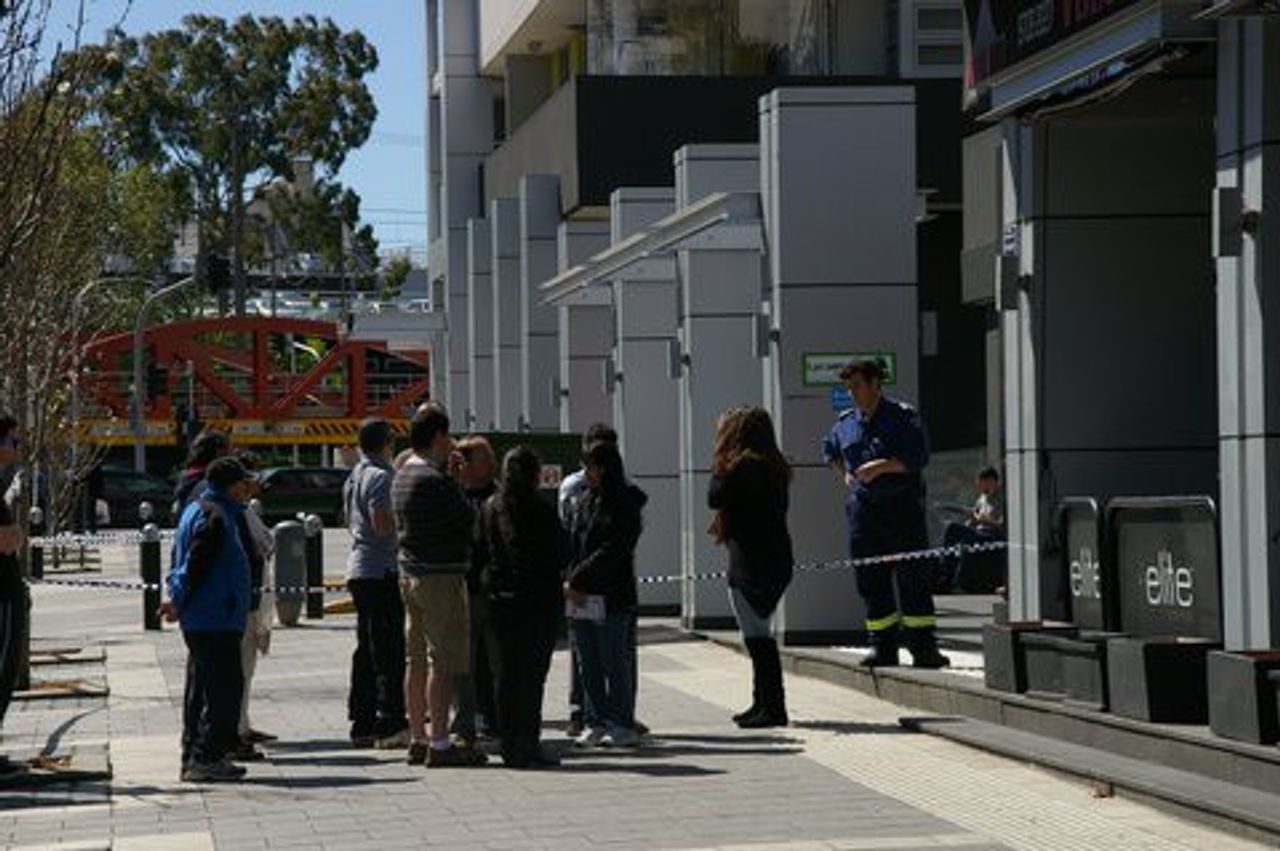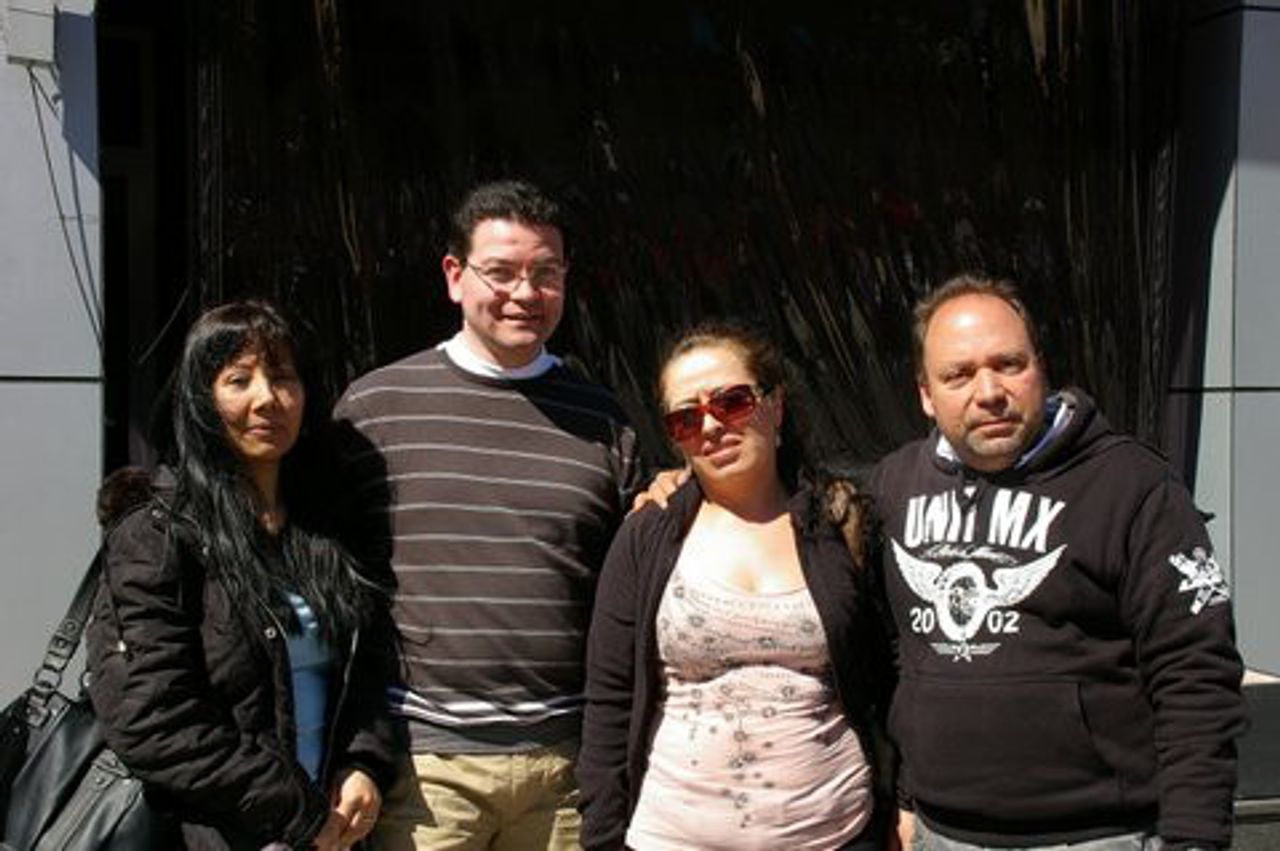Residents of the Sydney apartment building where the fatal fire occurred spoke to the WSWS. Mostly workers and students, they expressed shock and anger over the tragedy and the inadequate fire safety measures in the complex. Some had previously complained about the defects.
 Residents inquiring about access to their apartments
Residents inquiring about access to their apartmentsTariq Hammad, a meat factory worker, said he had been one of the first residents in the new building in 2009. Like many other residents, the fire caught him by surprise. “I was in the shower so I didn’t hear the alarm,” he explained. “When I came down to the street there were a lot of people everywhere, the fire fighters, and the police. All the residents were on the street.”
Hammad said that when he bought his unit he had been “told nothing about the safety issues” that had reportedly been raised by the fire brigade authorities with the local Bankstown Council.
 John
JohnJohn, a university student from China, shared a three-bedroom unit on level six with three others, and paid $135 a week for the room. “I’ve been living here for two years,” he said. “The fire alarm goes off regularly but most of the time it’s just a false alarm, so I didn’t pay any attention. But after about half an hour I realised there was a problem.”
John said he was worried about returning to live in the building. He was also unsure where he could live. “We were only offered accommodation for the first night... After that, we had to figure out somewhere to stay ourselves. Now I’m staying with my friends. There are probably many students from the University of Western Sydney, University of Technology and University of Sydney living here like me.”
Jose said residents had been told to stay elsewhere for at least a week. He asked: “What happens next? We don’t have insurance. We never thought something like this could happen. It’s a brand new building, only three years old.”
 Euro Terraces residents Claudia, Daniel, Sandra and Jose
Euro Terraces residents Claudia, Daniel, Sandra and JoseJose also asked: “Why did the unit burn so fast and so hot? The units have carpet—that will burn—and between some of the walls is chipboard. It’s usual to do that kind of building here… For the type of building, for the price, it was the best you could find at the time.”
Peter, who rents a unit on the seventh floor, also pointed to the numerous false alarms. “But that that day was different. I smelt it and I said, ‘this is for real.’ We have a small baby and we decided to use the fire stairs.”
Peter was angry that he and his wife were then left for nine hours in a local community hall with no baby facilities. After he asked what was being organised, officials said: “Don’t expect a five-star hotel.” He eventually walked out in disgust, to sleep on the floor at his brother’s flat.
Peter condemned the role of the Bankstown Council. “Yesterday a council official was saying they’ve been following the developer for two years to fix some things. I believe the council has been hypocritical. There’s a bureaucracy problem here, because how can you be after people for two years to fix up something in a place with 96 families? If something was wrong, write to the families and say, ‘Look that building is faulty, get out of there if you can.’
“That’s a duty of care, right? But they don’t have a duty of care. They don’t care. That’s not a building to raise families in. I always raised that concern with my wife. I don’t see this as a safe building. How come fire alarms are always going off?”
 Joel Wehbe
Joel WehbeAnother resident, Joel Wehbe, highlighted how dangerous the fire had been. His mother, who had been in his unit when the blaze broke out, had initially ignored the alarm and then ran down the fire stairs. “She was in a panic and didn’t know what was happening,” he explained.
Residents had then been left to fend for themselves, he said. “Apart from the first night, when we were helped by DOCS [Department of Community Services], there has been no help. We’re still waiting. The strata [building] management still hasn’t got back to us regarding what the authorities are going to do about accommodation and stuff… The first night I slept in the car because I had to go back to work the next day, then I went to my auntie’s place.”
Wehbe raised questions about the internal design of the units. “What happens if there’s a fire in the kitchen? Where are you going to get out from? Especially if you’re so high. You pretty much have to go to the balcony because people aren’t going to go through the smoke.”
 Jessie
JessieJessie is a community housing tenant in the building as part of a scheme that provides government subsidies for private rentals, instead of constructing public accommodation. She explained: “It’s community housing, so the landlord has a duty of care. If it’s not safe, they have to find me alternative housing… I’m on a low income, so I was eligible to move into this place.”
Jessie was scathing about the lack of safety, starting with the unit doors, which were meant to block fires. “The doors to the apartments are meant to be special doors that expand when it heats up and completely seal off the door, so the fire can’t get in or smoke,” she said. “The fire safety doors are supposed to last one hour, but they only last five minutes I would say. That’s not good.
“The door is supposed to have a metal thing on the back of it—which fell off after six months—that’s supposed to automatically close the door if it’s left open... We had a fire safety inspection this year and they didn’t pick up on those things at all. They were in and out in two seconds, and I never heard back from anyone to say, ‘This needs to be fixed or you need to do this’.”
Jessie said there were many other problems with the building. “The elevators are always playing up, the security screens on the driveway are constantly broken, and a couple of months ago someone managed to break into the car park and smash someone’s car window and a couple of days later firebomb another car... Even at the very beginning the air-conditioner didn’t work and I had to get a repairman out… And all the down lights had to be replaced because the wiring was faulty.”
The authors also recommend:
Australia: Bankstown fire exposes inadequate safety measures
[10 September 2012]
